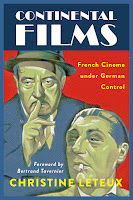My first review for Continental Films in the Shepherd Express and it's a good one!
French Cinema Under the NazisBY DAVID LUHRSSEN NOV. 25, 2022 8:40 A.M.Collaboration or resistance? They are usually put forward as obvious moral choices, especially when faced by Nazism, and especially in hindsight or by people who never had to choose. During the Nazi occupation of France during World War II, there were those like Charles De Gaulle, able to go abroad and continue to resist, and those who resisted by engaging in guerilla warfare or circulating underground newspapers. And of course, there were others who actively collaborated with the enemy.But in between, millions of people tried to continue their lives as best they could. What was the responsibility of public artists, especially actors and filmmakers, under the Nazi occupation? Should they have stopped working?That’s the question underlying the penetrating monograph by Christine Leteux, Continental Films: French Cinema Under German Control. The answer for many actors and filmmakers was that movies must be made, lest they be drafted into compulsory work brigades and sent to Germany to labor in factories or farms. Culture workers held a precarious exemption to forced labor. There was also the question of keeping their audience entertained in a time of hardship—and the possibility of smuggling subversion into entertainment.In his forward, French director Bertrand Tavernier praises Leteux’s book because it “shakes beliefs and prejudices, scrubs certain tall tales, and shows what lies below the tip of the iceberg.” Tavernier directed Laissez-passer (2002), a film about the studio the Germans established in occupied Paris, Continental Films, and recognizes very well the many shades of gray for those who kept working under Nazi oversight.Leteux writes with a trial lawyer’s precision, packing copious research into just over 200 pages. Continental Films was incorporated by the Germans under French law and run like a “normal” movie studio—to a point. There were contract negotiations, casting decisions and distribution deals—and informants on the sets. An overheard negative remark about Germany could cost a grip or a star his job. Leteux has produced a detailed picture of an industry under duress that never bogs down in unnecessary details.Continental’s German managers fled the Allied advance, and the French actors and crews were left to the mercy of the Resistance, some of whose fighters sought to make examples, execute rough justice or display their own sense of moral superiority. Many in the French film industry were jailed and interrogated for short periods. Some were placed under probation-like supervision. Many of those arrests were, as the author puts it, “worthy of a French farce.” And yet, the French justice system functioned well enough in the end. A handful of eager industry collaborators were sentenced to prison. Most of the film workers, who struggled during the war to accommodate themselves to an unwanted scenario, were able to resume their careers.Continental Films: French Cinema Under German Control is published by University of Wisconsin Press.


